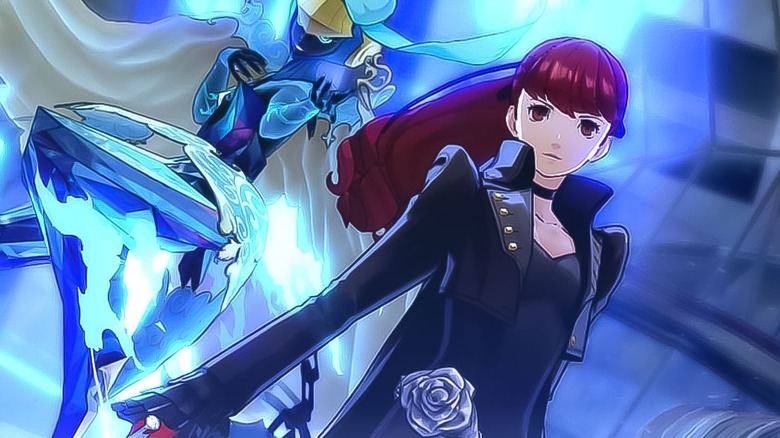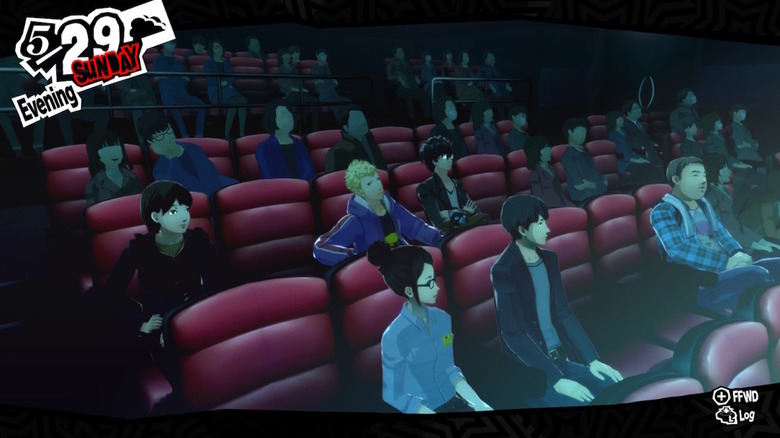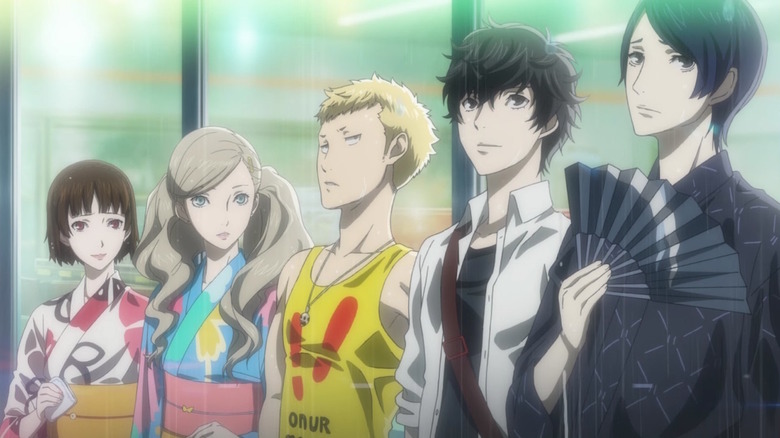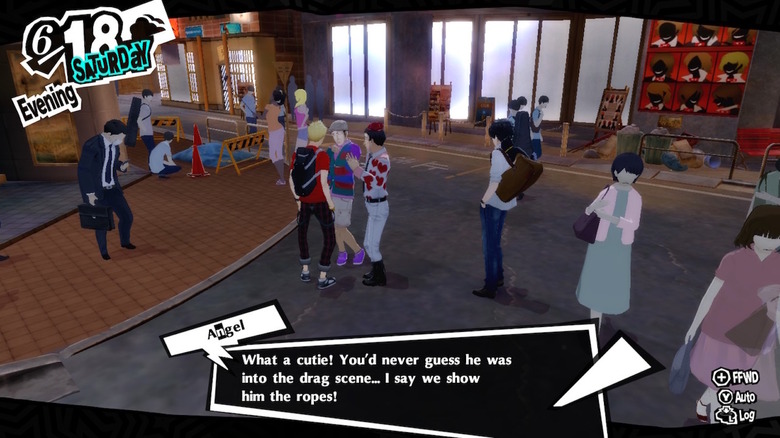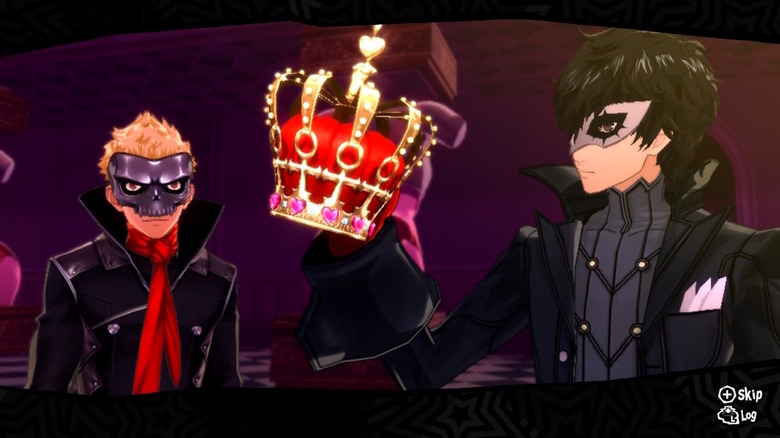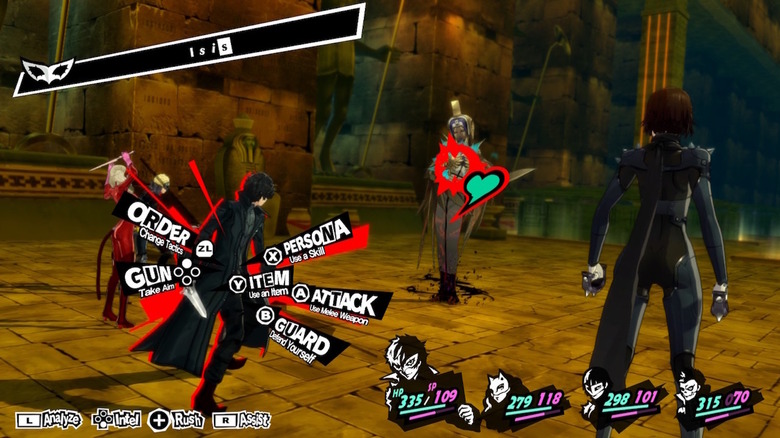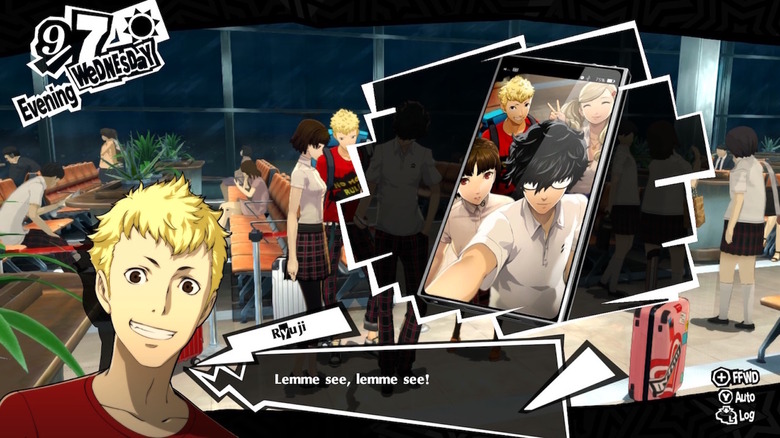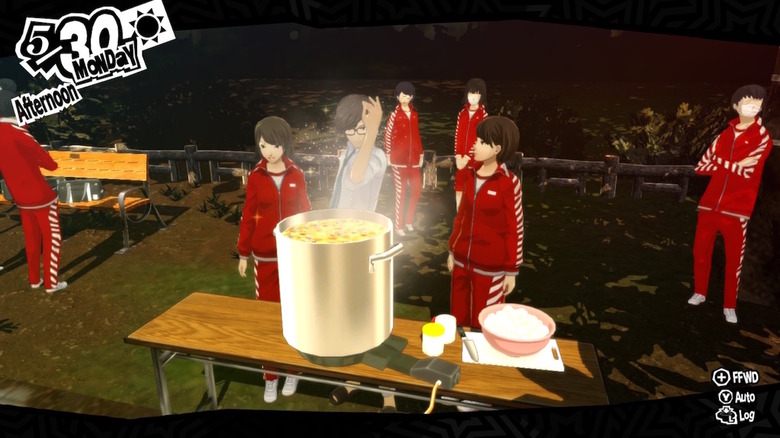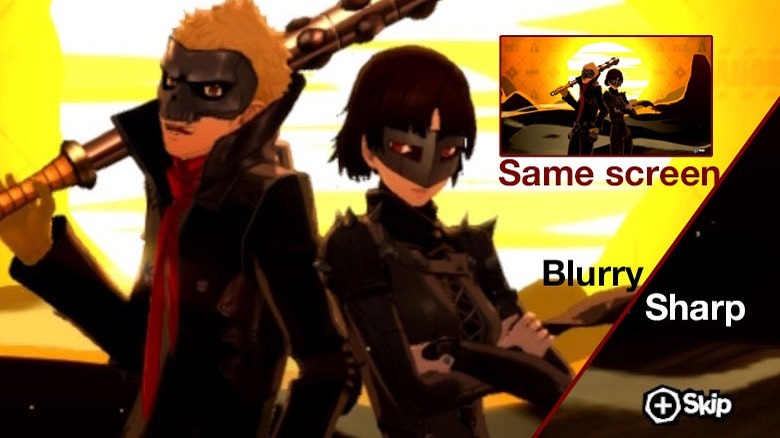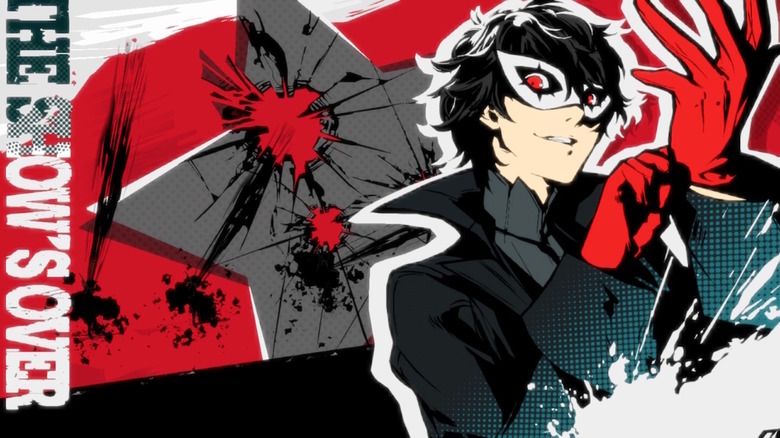Persona 5 Royal (Switch) Review: Best Version, Made Portable
- Loads of fun and interesting RPG mechanics
- A vast improvement over earlier games in the series
- Tough to put down
- Exquisitely stylish from top to bottom
- Takes a long while for the story to get going
- Visuals are a little blurry in handheld mode
- The world and people feel too grating at times
I have to admit it was a bit difficult to start in on "Persona 5 Royal" so soon after wrapping up "Persona 4 Golden." And not just because, as I've stated, its predecessor is probably my favorite video game of all time. Going into it I knew I preferred the older game, and that hasn't changed, but I couldn't figure out why.
"Persona 5" is an unquestionably great time and "Royal" makes it even better, but despite its myriad gameplay improvements, mechanical additions, and absolutely astonishing style, I really only wanted to play through it again because I was on a "Persona" kick and I remembered enjoying it back in 2016. Fortunately, it's since received its own enhanced release like "Golden" before it, and now it's on the Switch, so why not revisit it and see if I can figure out what's going on in my brain?
Well, after several hours (like 80+) I think I've finally been able to identify my problem with it. Thankfully I've also been able to get past said problem and finally get wrapped back up in the game proper. It just took a long time to get there.
Here's the deal
As is common for "Persona" games, "Persona 5" involves a group of high school friends dipping in and out of a surreal other-world to fight monsters pulled from human consciousness (called "shadows") for one reason or another. Then they eventually find out something much bigger is afoot and have to fight a god (or several) to save the world from the real threat. And in between all of the fighting and world-saving, they have to keep going to school and hanging out with friends.
This time around the specifics involve your main character stepping in to stop an assault, only to then get a criminal assault charge for himself because said agressor is actually a very powerful (and terrible) person. Now he's on probation, has had to transfer schools, and basically had his life and future put on shaking ground. It only gets more complicated from there — I don't want to go into much more detail since there are plenty of twists and moments of intrigue that are better left un-spoiled.
The discovery of said cognitive world (the almost presciently named "Metaverse") leads to the formation of The Phantom Thieves, who sneak into a representation of their target's twisted heart and "steal their distorted desires." Once the deed is done, the twisted individual will have a "change of heart" and admit their crimes and turn themselves in. It's a bit much to gloss over but trust me, it makes sense in the game.
Patience is required
A big factor in why it was so much tougher for me to get wrapped up in "Persona 5" over "Persona 4" is that the story in "Persona 5" takes a lot longer to ramp up. Like, dozens of hours versus a few. "Persona 4" grabbed my attention fairly quickly with its murder mystery and friend rescue angle. "Persona 5" grabbed my attention with its early Metaverse and Palace reveal, but kinda sputtered out right after that. It wasn't until Palace number three, roughly 30 hours in, that I could feel my interest piquing again. I don't mean to imply I was bored or disinterested with the preceding 29 or so hours, but I wasn't being pulled along by the story.
The other reason I have a tougher time getting into "Persona 5" is that it's extremely oppressive. Everyone is judgmental, gossipy, absurd, and (in a real-world sense) irresponsible. Rumors fly around like mad — it basically gives some of the worst aspects of humanity the spotlight. I understand this conceptually since the game's main theme is changing the hearts of the vile and corrupted, but it's just so dour all the time.
The first animal cruelty subplot made me want to call it an early night. The second one felt even more heavy-handed. Then there's a wide variety of dark content that's certainly not made for children. It's a mature game with mature themes, and it sure does like to make sure you don't forget that.
An improved script
I devoted a section of the "Golden" review to its writing missteps with regard to certain subjects, and unfortunately, I feel the need to do the same with "Royal." Though in this case, I don't think it's quite as off-putting. But it does still fumble in places. The original "Persona 5" contained a couple of instances of poorly-handled bits that were intended to add levity — but didn't land particularly well (or even blow up in the game's metaphorical face). Some of these elements have been rewritten and dialog re-recorded in "Royal," so while they're still present, the context and approach have been altered to make them a little less... seemingly mean-spirited.
Also if you aren't familiar with the plot of "Persona 5," know that it deals with a lot of mature subject matter — and not always with the best tact. It's not necessarily purely mean-spirited, but there are a few moments peppered throughout that left me feeling like the script could have used an extra pass or two. And unfortunately, these moments didn't receive the same treatment as those re-written jokes. If nothing else, just be aware that "Persona 5" touches on way grimmer — and all too real — topics than its predecessor, so if there's certain content you'd prefer to avoid (like with me and the animal mistreatment) I'd recommend looking over something like a synopsis before starting it up for yourself.
Take Your Heart
My favorite gameplay change going from "Persona 4" to "Persona 5" is the way dungeons are handled. In the previous game, they were fine, and most had some really memorable music, but functionally they were all the same. Just an assortment of usually eight to a dozen or so floors that mostly had random layouts that were themed to match a specific character's thoughts or feelings, and maybe the occasional need to return to a previous floor after finding a specific item.
This time around the dungeons (called "Palaces") are far more interesting as they not only have their own individual themes but are also no longer randomized. Instead, they're hand-crafted levels full of intended room layouts and enemy placements, with actual puzzles to solve and everything. I can't overstate just how much more fun I have in these palaces over the mechanically monotonous dungeons of "Persona 4" (except the Hollow Forest, which at least tried to mix up the formula a bit).
Even the pacing of a palace infiltration works to enhance the "Phantom Thief" concept and make it feel more like, well, an infiltration. You have to steadily work your way through each one, unlocking shortcuts and accessing new areas, before finally locating its incorporeal treasure. And once you do that you actually have to leave in order to send the target a calling card and make their treasure manifest. It goes a long way to making it feel like you're really sneaking into a fortified location while figuring out access points and routes before finally making your move.
Throwdown
Like many RPGs, "Royal" utilizes a turn-based combat system whenever you face off against enemies, with a variety of attack types, elemental magic, and status effects to make most fights pretty strategic and engaging. But this series (and particularly this game) goes so far beyond those fundamentals. Hitting an enemy with an attack type they're weak against will knock them down and give the attacker a second free turn, giving you the opportunity to chain together devastating combos or give yourself some breathing room to heal and whatnot. And if you knock all of the enemies down in one turn, you can perform a group attack for massive damage.
It's fairly standard for this series (and other "Shin Megami Tensei" games), but this one adds even more nuance to it all. Like two new magic elements (compared to "Persona 4," anyway), physical damage types for both melee weapons and firearms, and a Baton Pass option after hitting an enemy's weakness that lets you pass that character's free turn to a different character — opening up even more possibilities for completely destroying your targets.
Another element "Persona 5" adds — or rather brings back — is conversations. Instead of performing a group attack when all of the enemies are knocked down, you also have the option of talking to them. You can ask for money, ask for an item, or see if they're interested in joining you — and if you're convincing enough they'll actually do just that, becoming a new Persona for the main character to wield.
Friends matter. A lot
Another aspect "Persona 5" (and by extension, "Royal") shares with the previous two games is a "Social Links" system (though here they're called "Confidants"). These are the bonds you can choose to form with a number of characters you'll meet, from teammates and the obligatory parental stand-in to school faculty and fortune tellers. As before, every rank (from one to ten) will boost your Persona-creation prowess, in addition to giving you much more insight into a given character. And in the case of team members, make them more effective in combat.
But what's really cool about either version of this game in particular is that you get far more tangible benefits to these relationships. Don't get me wrong, I enjoyed pursuing social links in the earlier games because I wanted to spend more time with these characters, but now there are way more perks that come with it. Now everyone, not just fellow Phantom Thieves, will occasionally make your life that much easier by unlocking useful perks.
Some of these perks will give you more options in a fight (like swapping party members mid-battle), others will make palace infiltration easier (i.e. making you tougher for patrolling Shadows to spot), and one even lets team members that aren't in the active party earn experience from battle. I've yet to max out every single Confidant yet — because there are so many and the in-game days are limited — but every single one of them so far has provided at least a couple of extremely worthwhile boons.
The 'Royal' treatment
Much like "Golden" before it, "Persona 5 Royal" acts as a sort of director's cut or definitive version of the original game. Also much like "Golden," this game incorporates its new content and other changes so well it would basically be impossible for a newcomer to be able to tell what wasn't in that initial release. Heck, even though I beat the original game once before I've still had a tough time spotting some (not all, but definitely some) of the additions.
There are some new Social Links/Confidants this time around — with their own respective stories and perks of course — as well as a number of mechanical additions like improved Baton Pass effects (upgraded by playing a new darts mini-game with other Thieves). You have more locations to visit and shop at, some new tunes to compliment the already excellent soundtrack, and more opportunities to boost multiple Confidants' progress at once with some added events. And this doesn't even touch on the bulk of the new story content that happens in the late game.
Though the best change in my mind is the increased amount of freedom to do things outside of the metaverse. You can still only perform one significant action (read a book, watch a movie, hang out with someone, etc) in the day and one at night, but the original "Persona 5" was frustratingly stingy with these opportunities and often kept you from being able to do anything on some days. That does still happen in "Royal," but much less frequently. I'm still not convinced I'll be able to max out every Confidant by the game's end, but at least this time around I've been able to make a lot more progress.
Playing on the Switch
"Persona 5 Royal" is not a new game in and of itself, having originally released in 2019 as a PlayStation exclusive, but it didn't hit the Switch until late 2022. And while it may not be a minor miracle to see running on Nintendo's hybrid console like "No Man's Sky" is, it's also much more resource-heavy than "Persona 4 Golden." The visuals are far more detailed, the animations are more varied and complex, there's a larger variety of backdrops for various scenes, and I'm pretty sure there are more recorded voice lines but that one's mostly speculative on my part.
I haven't played "Royal" before this (my experience is limited to the original on PlayStation 4), so I can't comment on how the Switch release compares to heftier platforms like PC or the Xbox Series X|S. But from what I remember of the initial release it looks pretty darned spot-on here. A handful of the background textures (mostly signage) may look a little blocky or blurry if I look closely, but the character models all look as good as I remember them and none of the game's unique visual flair seems to have suffered. It also runs well and loading times are fairly quick, though I'm not sure if that's an improvement or comparable to other versions.
The one problem I noticed is that the game world and characters look a bit blurry in handheld mode while the interface elements (menus, date and time, etc) look nice and sharp. It's weird. I think it has something to do with the graphical filters used but it's far from unplayable — it's just a thing I noticed and thought was odd.
Persona 5 Royal verdict
Admittedly, in the earlier portions of my playthrough, I was intending to give "Persona 5 Royal" on the Switch a slightly different (i.e. lower) score due to my initial lack of investment in the overall story. Thankfully it did pick up, and it became pretty difficult to stop playing once the story hit its stride and I fell into a rhythm of hanging out with people and fighting shadow monsters, but I do think it took too long to get there. Still, I can't deny that I've been having a great time with it. Heck, I'd even say it's been better than my first playthrough on the PS4, thanks in no small part to the "Royal" adjustments.
If I'm put on the spot I still wouldn't place this above "Golden" in my own personal hierarchy, but that shouldn't deter you from checking it out for yourself. "Royal" is a fantastic upgrade that makes a really good game even better, and I can't deny that it's the more fun of the two to actually sit down and play for prolonged periods of time. And if it's on the Switch you get the choice of playing on a TV or in handheld mode, which means staying up way too late playing in bed because I just want to get Sojiro to rank 10 why do you make it so difficult to get to know you Sojiro — let me in!
Point is, it's well worth the time investment and the $59.99 price tag. Though I did nab it on sale for $41.99 — that just makes it even more worthwhile.
